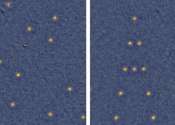Physicists reveal the role of diffusion in the early universe
Scientists from the Space Research Institute of the Russian Academy of Sciences (IKI RAS), the Moscow Institute of Physics and Technology (MIPT), and the Max Planck Institute for Astrophysics (MPA) have shown that diffusion ...









